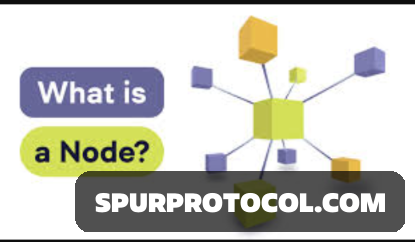WHAT IS A NODE IN CRYPTO?
I can bet that you are running a node right now as you are reading this; maybe a light node on your browser extension, but the question is, do you know what a node is?, well, if you don't or have forgotten, then read on
Go Back

🕒 3:12 PM
📅 Mar 07, 2025
✍️ By BrigxelBiz
WHAT IS A NODE IN CRYPTO?
You can simply say that a node is any computer that is connected to a blockchain. This definition captures a core element of what a node is,but it goes beyond this, To be precise, we can say that
a node is a computer (or other device) that is connected to a blockchain network.But, it's not just all about the connection. The connection must involve running specific blockchain software. and this software allows the computer to participate in the network's operations.
The Functions of a Blockchain Node:
It maintains the Ledger:
As we know, the blockchain is a distributed ledger of transactions and every participant in the network must have access to the same, consistent data. To achieve this, nodes store and update a copy of the blockchain.
Validating Transactions:
Nodes verify the legitimacy of new transactions by checking if they follow the rules of the blockchain.This validation process is very important for preventing fraudulent activities such as double-spending and this is achieved by timestamping transactions and chaining them together using cryptographic techniques.
The issue of double-spending is worth discussing in a separate article so stay tuned and watch out for my next post here on spur protocol, in the meantime, let's ride on
Participating in Consensus:
Different blockchains use different consensus mechanisms, such as Proof of Work (PoW) or Proof of Stake (PoS). Nodes play a crucial role in these types of consensus mechanisms which helps the network agree on the validity of new blocks of transactions.
Broadcasting Data:
Nodes also broadcast new transactions and blocks to other nodes in the network, ensuring that the ledger is updated across all participants.
Types of Nodes:
There are different types of nodes with different functions
Full Nodes:
These nodes store the entire blockchain history.
They play a very important role in maintaining the integrity and security of the network.
Light Nodes:
These nodes store only a portion of the blockchain data and depend on full nodes to access the complete ledger. A good example are those node we run on our browser extensions
Validator Nodes:
These are another type of nodes. They take part in the validation of blocks and transactions, and are very necessary in Proof of Stake systems.
Archive Nodes:
Finally, these nodes are used for detailed data analysis because they keep a complete history of the blockchain the blockchain
Why Run a Node?
Increased Security: Running a node helps in strengthening the security of the blockchain network.
Enhanced Privacy: Running your own node can provide greater privacy compared to relying on third-party services.
Network Participation: Running a node allows you to actively participate in the decentralized processes of the network
Support for Decentralization: Running nodes help to keep the blockchain decentralized, which is an important feature of its design.
